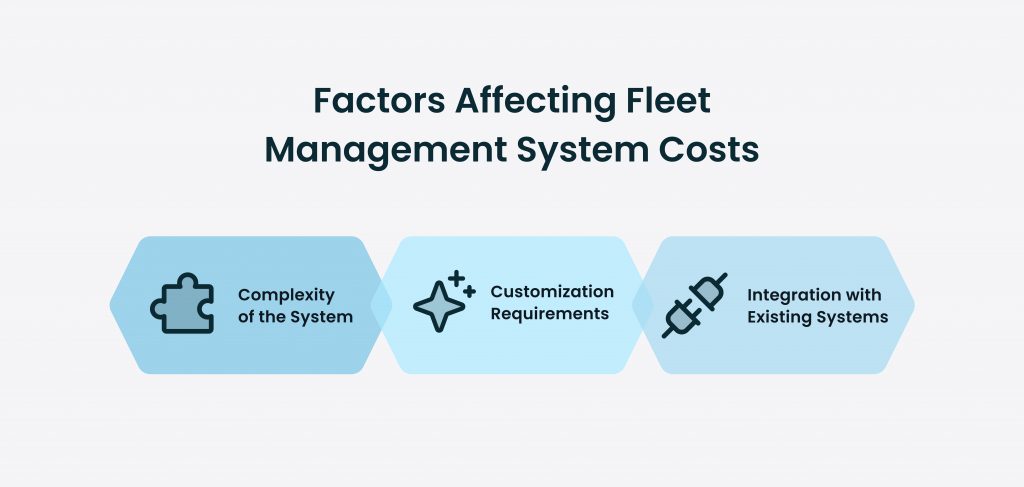Fleet management systems have become an indispensable tool for organizations with a large number of vehicles to manage. The ability to track, monitor, and optimize fleet operations can lead to significant cost savings and improved efficiency. However, before embarking on the development of a fleet management system, it is important to understand the factors that influence its cost. In this article, we will explore the key features of a fleet management system, the factors that influence its cost, the breakdown of development costs, the importance of choosing the right development partner, and the return on investment for such a system.
Understanding Fleet Management Systems
Before delving into the cost considerations, let’s first establish what a fleet management system actually is. A fleet management system is a comprehensive software solution designed to centralize and automate various tasks and processes related to fleet operations. It enables organizations to effectively manage their vehicles, drivers, and related assets.
What is a Fleet Management System?
A fleet management system is a sophisticated software solution that allows organizations to track and monitor their fleet of vehicles in real-time. It provides features such as vehicle tracking, driver management, fuel management, maintenance scheduling, and route optimization. The system collects data from various sources, such as GPS devices, on-board sensors, and fuel cards, and aggregates it into a single, user-friendly interface.
With vehicle tracking, organizations can have a bird’s eye view of their entire fleet. They can see the location of each vehicle, its speed, and even its current status. This real-time information allows fleet managers to make informed decisions and respond promptly to any issues that may arise.
Key Features of a Fleet Management System
A fleet management system typically includes a wide range of features that enable organizations to effectively manage their fleet operations. These features can vary from system to system, but some common ones include:
- Vehicle Tracking: Real-time tracking of vehicle location, speed, and status.
- Driver Management: Monitoring driver behavior, performance, and compliance.
- Fuel Management: Tracking fuel consumption, mileage, and costs.
- Maintenance Scheduling: Reminders for routine maintenance and repairs.
- Route Optimization: Optimizing routes for fuel efficiency and timely deliveries.
- Reporting and Analytics: Generating insightful reports and analyzing fleet performance.
Vehicle tracking is one of the most essential features of a fleet management system. It allows fleet managers to have real-time visibility into the location and status of each vehicle. This not only helps in ensuring the safety and security of the fleet but also enables efficient dispatching and route planning. With the ability to track vehicles, organizations can optimize their operations by assigning the nearest available vehicle to a job, reducing travel time and fuel consumption.
Driver management is another crucial aspect of fleet management systems. By monitoring driver behavior, performance, and compliance, organizations can ensure that their drivers adhere to safe driving practices and comply with regulations. The system can track factors such as speeding, harsh braking, and idling, providing fleet managers with insights to address any issues and improve driver performance.
Fuel management is an important feature that helps organizations track fuel consumption, mileage, and costs. By closely monitoring fuel usage, fleet managers can identify any inefficiencies or anomalies and take corrective actions. This can lead to significant cost savings and environmental benefits by reducing fuel wastage and optimizing fuel efficiency.
Maintenance scheduling is another key feature that ensures the fleet is properly maintained and serviced. The system can send reminders for routine maintenance tasks, such as oil changes and tire rotations, as well as schedule repairs for any reported issues. By proactively managing maintenance, organizations can minimize vehicle downtime and extend the lifespan of their fleet.
Route optimization is a feature that helps organizations plan the most efficient routes for their vehicles. By considering factors such as traffic conditions, distance, and fuel consumption, the system can suggest optimal routes that minimize travel time and fuel costs. This not only improves operational efficiency but also enables timely deliveries and customer satisfaction.
Reporting and analytics capabilities are essential for fleet managers to gain insights into their fleet’s performance. The system can generate various reports, such as fuel consumption reports, driver performance reports, and maintenance history reports. These reports provide valuable data that can be analyzed to identify trends, areas for improvement, and cost-saving opportunities.
In conclusion, a fleet management system is a powerful tool that enables organizations to effectively manage their fleet operations. With features such as vehicle tracking, driver management, fuel management, maintenance scheduling, route optimization, and reporting, these systems provide the necessary tools and insights to optimize fleet performance, reduce costs, and enhance overall efficiency.
Factors Influencing the Cost of Fleet Management System Development

Now that we have a clear understanding of what a fleet management system entails, let’s dive into the factors that influence its cost. The cost of developing a fleet management system can vary significantly depending on various factors. Here are some key factors to consider:
Complexity of the System
The complexity of the fleet management system is one of the main factors that determine its cost. A basic system with essential features will have a lower development cost compared to a more advanced system with additional features and integrations. The complexity can also be influenced by the size of the fleet and the specific requirements of the organization.
For example, a fleet management system for a small delivery company may only need basic features such as vehicle tracking, fuel management, and maintenance scheduling. On the other hand, a fleet management system for a large logistics company may require advanced features like route optimization, driver performance monitoring, and real-time analytics.
The complexity of the system can also be influenced by the industry in which the organization operates. For instance, a fleet management system for a transportation company that deals with hazardous materials will require additional features to ensure compliance with safety regulations.
Customization Requirements
Every organization has unique requirements when it comes to fleet management. Some organizations may need certain features tailored to their specific needs or industry. Customization requirements can increase the development cost of the system, as they require additional time and effort to implement.
For example, a construction company may require a fleet management system that can track not only vehicles but also heavy equipment and machinery. This customization would involve developing new modules and integrating them into the system, which would add to the overall cost.
Furthermore, organizations may have specific reporting or data analysis needs that require customization. This could involve creating custom dashboards or generating specialized reports, which would require additional development work.
Integration with Existing Systems
Integrating the fleet management system with existing software systems, such as ERPs or CRMs, can also impact the development cost. Integration requires careful planning and development to ensure seamless data transfer and interoperability between systems.
For example, if an organization already has an ERP system in place for managing inventory and procurement, integrating the fleet management system with the ERP would allow for better coordination and optimization of resources. However, this integration would require additional development work to establish data synchronization and ensure that both systems work together seamlessly.
Integration with other systems can also involve integrating with third-party APIs or cloud services. This can add complexity to the development process and may require additional resources or expertise, which can increase the overall cost of the fleet management system.
Breakdown of Development Costs
Now that we have explored the factors that influence the cost of fleet management system development, let’s break down the different cost components involved:
Software Development Costs
The software development costs include activities such as requirements analysis, system design, coding, testing, and deployment. This is where the expertise of a software development company like WeSoftYou comes into play. We at WeSoftYou have a proven track record in developing robust and scalable fleet management systems.
When it comes to requirements analysis, our team of experts will work closely with your organization to understand your specific needs and goals. We will conduct thorough research and gather all the necessary information to ensure that the software meets your expectations.
System design is another crucial aspect of software development. Our experienced designers will create a detailed blueprint of the fleet management system, taking into consideration factors such as user interface, functionality, and scalability. This blueprint will serve as a roadmap for the development process.
Coding is the actual implementation of the system design. Our skilled developers will write clean and efficient code, following industry best practices and standards. We will also conduct rigorous testing to identify and fix any issues or bugs before deployment.
Deployment involves the installation and configuration of the fleet management system on your organization’s infrastructure. Our team will ensure a smooth and seamless deployment process, minimizing any disruptions to your operations.
Hardware Costs
In addition to the software development costs, organizations need to consider the hardware costs associated with the fleet management system. This includes devices such as GPS trackers, on-board computers, and sensors. The cost of hardware can vary depending on the number of vehicles and the desired level of functionality.
When it comes to GPS trackers, we will help you choose the most suitable devices for your fleet. We will consider factors such as accuracy, durability, and compatibility with the software. Our team will also assist with the installation and configuration of the trackers.
On-board computers play a crucial role in collecting and processing data from the vehicles. We will help you select the right computers that meet your requirements in terms of processing power, storage capacity, and connectivity options.
Sensors are another important component of a fleet management system. They can provide valuable data on various parameters such as fuel consumption, engine performance, and tire pressure. We will work with you to determine the types and number of sensors needed for your fleet.
Maintenance and Support Costs
After the system is developed and deployed, ongoing maintenance and support are crucial for its smooth operation. This includes bug fixes, updates, and user support. Organizations should budget for these ongoing costs to ensure the longevity and effectiveness of the fleet management system.
Our team at WeSoftYou understands the importance of providing timely and efficient support to our clients. We offer various support packages tailored to your specific needs. Whether you require 24/7 technical assistance or periodic updates and maintenance, we have you covered.
In case any bugs or issues arise, our dedicated support team will quickly identify and resolve them, minimizing any disruptions to your fleet management operations. We also keep track of industry trends and technological advancements to ensure that your system remains up-to-date and optimized.
User support is another crucial aspect of maintenance and support. Our team will provide comprehensive training to your staff on how to effectively use the fleet management system. We will also be available to address any questions or concerns that may arise during the day-to-day operation of the system.
Choosing the Right Development Partner
Developing a fleet management system requires the expertise and experience of a reliable software development partner. WeSoftYou, with its extensive experience in software development, can be your trusted partner in developing a customized fleet management system.
When it comes to fleet management systems, there are several factors to consider. From vehicle tracking and maintenance to driver management and fuel efficiency, a comprehensive and efficient system is crucial for the smooth operation of any fleet. This is where the expertise of a development partner like WeSoftYou comes into play.
With years of experience in the industry, WeSoftYou understands the unique challenges and requirements of fleet management systems. Our team of skilled developers and engineers have worked on numerous projects, delivering high-quality software solutions that meet and exceed client expectations.
Evaluating Expertise and Experience
When choosing a development partner, it is important to evaluate their expertise and experience in developing fleet management systems. Look for a company that has a proven track record of delivering high-quality software solutions.
WeSoftYou takes pride in its extensive portfolio of successful fleet management system projects. Our team has worked with clients from various industries, including transportation, logistics, and delivery services. We have developed systems that handle large fleets with complex requirements, ensuring efficient operations and cost savings for our clients.
Our expertise extends beyond just software development. We understand the importance of integrating various technologies and systems seamlessly. From GPS tracking and telematics to data analytics and reporting, we have the knowledge and experience to create a comprehensive fleet management system that meets your specific needs.
Understanding Pricing Models
As a software development company with a proven track record, WeSoftYou understands the importance of transparent pricing and flexible engagement models. We provide detailed project estimation and offer various pricing options to suit your budget and requirements.
Our pricing models are designed to provide transparency and flexibility. We work closely with our clients to understand their budget constraints and tailor our solutions accordingly. Whether you prefer a fixed-price model or a time and materials model, we can accommodate your needs.
In addition to our competitive pricing, we also offer ongoing support and maintenance services. We understand that a fleet management system requires continuous updates and improvements to keep up with changing industry trends and regulations. Our team is always available to provide technical support and address any issues that may arise.
Choosing the right development partner for your fleet management system is crucial for its success. With WeSoftYou, you can be confident in our expertise, experience, and commitment to delivering high-quality software solutions that drive efficiency and cost savings for your fleet operations.
Return on Investment for a Fleet Management System
Investing in a fleet management system may seem like a significant expense at first, but it is crucial to consider the potential return on investment (ROI) that it can bring to your organization. By implementing a well-designed and efficient fleet management system, you can unlock numerous benefits and advantages that can positively impact your business.
Operational Efficiency Gains
One of the primary advantages of a fleet management system is the improvement in operational efficiency. By automating manual tasks and streamlining processes, such a system can significantly enhance the overall productivity of your fleet operations. For instance, it can optimize routes by considering factors such as traffic patterns, road conditions, and real-time data on vehicle locations. This optimization can lead to reduced travel time, minimized fuel consumption, and ultimately, cost savings.
In addition to route optimization, a fleet management system can also help in reducing idle time. By monitoring vehicle usage and identifying instances of unnecessary idling, the system can prompt drivers to turn off their engines when not in use. This simple measure can result in substantial fuel savings and contribute to a greener and more sustainable fleet.
Cost Savings and Revenue Generation
Implementing a fleet management system can lead to significant cost savings for your organization. By effectively managing fuel consumption, maintenance schedules, and driver behavior, you can reduce expenses associated with these areas. For example, the system can provide real-time data on fuel usage and identify instances of excessive consumption or fuel theft. By addressing these issues promptly, you can curtail unnecessary expenses and ensure optimal fuel efficiency.
Furthermore, a fleet management system can enable your organization to explore new revenue streams. By leveraging the real-time data and insights provided by the system, you can offer value-added services to your customers. For instance, you can provide them with accurate and up-to-date information on the estimated time of arrival (ETA) of their deliveries, enhancing their overall experience and satisfaction. This added value can potentially lead to increased customer loyalty and repeat business.
In conclusion, while the initial cost of implementing a fleet management system may seem significant, the potential return on investment it offers is substantial. By improving operational efficiency, reducing costs, and exploring new revenue opportunities, such a system can bring long-term benefits to your organization. It is essential to carefully evaluate the specific needs and requirements of your fleet and choose a fleet management system that aligns with your goals and objectives.
Conclusion: Is It Worth the Investment?
In conclusion, the cost of developing a fleet management system can vary depending on factors such as system complexity, customization requirements, and integration needs. However, when considering the potential benefits and ROI, investing in a fleet management system can be well worth the initial cost. WeSoftYou, with its expertise in software development, can help you navigate the development process and create a customized fleet management system tailored to your organization’s needs.
FAQ
A fleet management system is a comprehensive software solution that allows organizations to track and monitor their fleet of vehicles in real-time. It provides features such as vehicle tracking, driver management, fuel management, maintenance scheduling, and route optimization. Vehicle tracking is a crucial aspect of fleet management systems. It involves the use of GPS technology to monitor the location and movement of vehicles. This allows organizations to have real-time visibility into their fleet, ensuring efficient allocation of resources and timely response to any issues or emergencies.
Driver management is another important feature of fleet management systems. It enables organizations to monitor driver behavior, such as speed, harsh braking, and idling time. This information can be used to identify areas for improvement, provide training to drivers, and promote safe driving practices.
Fuel management is a key concern for organizations with large fleets. Fleet management systems help in monitoring fuel consumption, identifying fuel theft or misuse, and optimizing fuel efficiency. By reducing fuel wastage and improving fuel economy, organizations can significantly reduce their operating costs.
Maintenance scheduling is essential to ensure the proper functioning and longevity of fleet vehicles. Fleet management systems provide tools to schedule regular maintenance tasks, track vehicle service history, and generate maintenance reports. This proactive approach helps in preventing breakdowns, minimizing downtime, and extending the lifespan of vehicles.
Route optimization is a feature that helps organizations plan and optimize the routes taken by their fleet vehicles. By considering factors such as traffic conditions, distance, and delivery schedules, fleet management systems can suggest the most efficient routes. This not only saves time but also reduces fuel consumption and improves customer satisfaction.
The cost of developing a fleet management system can vary depending on factors such as system complexity, customization requirements, and integration needs. We at WeSoftYou provide tailored project estimations based on your specific requirements. The complexity of the fleet management system plays a significant role in determining the development cost. A basic system with essential features may have a lower cost compared to a more advanced system with additional functionalities.
Customization requirements also impact the development cost. Organizations may have specific needs and preferences that require customization of the fleet management system. This could involve developing new features, integrating with existing systems, or designing a user interface that aligns with the organization’s branding.
Integration needs refer to the requirement of integrating the fleet management system with other software or hardware components. For example, integration with GPS devices, fuel sensors, or maintenance management systems. The complexity and effort involved in these integrations can influence the development cost.
At WeSoftYou, we understand that each organization has unique requirements and constraints. Our team of experts will work closely with you to analyze your needs and provide an accurate project estimation that takes into account all relevant factors.
A fleet management system can bring several benefits, including improved operational efficiency, cost savings, and revenue generation. It enables organizations to optimize routes, track fuel consumption, and monitor driver behavior, resulting in increased productivity and reduced costs. Improved operational efficiency is one of the key advantages of implementing a fleet management system. By utilizing real-time data and advanced analytics, organizations can make informed decisions regarding route planning, vehicle allocation, and resource optimization. This leads to streamlined operations, reduced idle time, and improved overall efficiency.
Cost savings are another significant benefit of fleet management systems. By optimizing routes and reducing fuel consumption, organizations can achieve substantial cost reductions. Additionally, proactive maintenance scheduling helps in preventing costly breakdowns and extends the lifespan of vehicles, further reducing maintenance and replacement costs.
Fleet management systems also contribute to revenue generation. By improving operational efficiency and customer service, organizations can enhance their competitiveness and attract more clients. Additionally, the ability to provide accurate delivery estimates and real-time tracking information can lead to increased customer satisfaction and repeat business.
Furthermore, fleet management systems enable organizations to monitor driver behavior and promote safe driving practices. This not only reduces the risk of accidents and associated costs but also helps in maintaining a positive brand image and ensuring compliance with regulatory requirements.
If you are ready to discuss your fleet management system development project or need a free consultation, contact us at WeSoftYou. Our expert team will be happy to assist you and provide a customized project estimation based on your specific requirements. Don’t miss out on the opportunity to optimize your fleet operations and drive business growth with a tailored fleet management system.
Contact us today for a free consultation or project estimation.






















